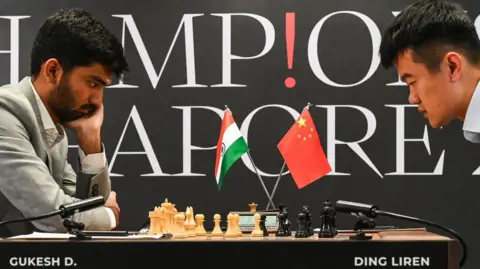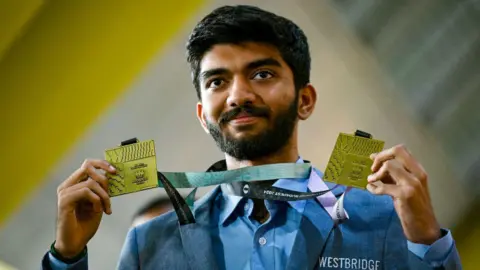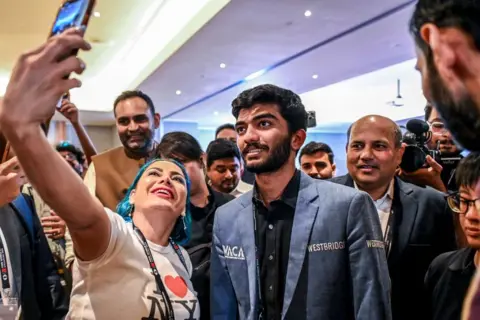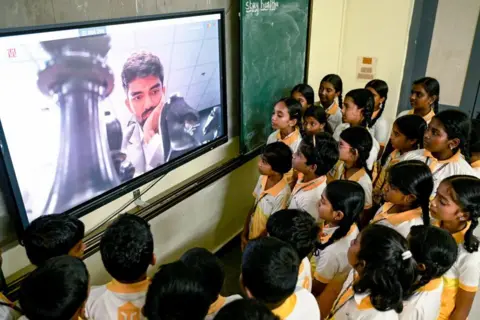The Indian teen who became the world's youngest chess champion
Indian teenager Gukesh Dommaraju shocked the world of chess on Thursday when he became the youngest world champion at the age of just 18.
The Chennai-born prodigy defeated defending champion, China's Ding Liren, in a dramatic match staged in Singapore which he had entered as the challenger. The FIDE World Chess Championship carries a $2.5m (£1.96m) prize fund.
It marked the peak to date of his career, his greatest moment in a long string of achievements.
Gukesh became a grandmaster aged 12 years and seven months and even then, he was upfront about the fact that he dreamt of being the world champion.
In fact, he said he had harboured such ambitions since he was seven when he was a spectator at a World Title match between Viswanathan Anand and Magnus Carlsen in 2013.
As he confessed at the press conference following his dramatic win against Ding, he just didn't think it would happen so soon.
"Throughout the match I had several chances to clinch victories and many of the games which would have put me in the front foot quite seriously. But once I was getting close I was getting nervous and I was not able to finish him off," Gukesh told the BBC after the win.
"...And then all of a sudden...it was a sudden change and I could not process all the new information so quickly."
Gukesh is the 18th world champion since Wilhelm Steinitz won what is considered the first title match way back in 1886.
Born in May 2006, Gukesh is also, by far, the youngest player to have ascended this pinnacle.
He comfortably improved upon the prior record held by Garry Kasparov (born April 1963) who was 22 when he won the title in Moscow in November 1985 by beating Anatoly Karpov.
The 14-game match was tied with two wins each after 13 games. It looked as though the 14th game was heading for a draw.
In that case, there would have been tiebreaks played at progressively shorter time controls.
But Ding blundered on move 55 and Gukesh exploited the error to clinch the title.
 AFP
AFPOver the last three years the young player has made a string of extraordinary achievements, culminating in this victory.
Gukesh won the individual gold medal for best performance in the last two Olympiads. He led India to a team bronze at Chennai in 2022 and the gold medal in 2024 in Budapest.
He also won the Candidates - the tournament that earned him the right to challenge Ding Liren.
Earlier in his teens, Gukesh was ruled out as a prospective challenger by his mentor, the former world champion Viswanathan Anand, or "Vishy Sir" as Gukesh calls him. He thought Gukesh simply didn't have enough experience.
Indeed, Gukesh suffered an apparently catastrophic loss at the midway stage, but then he pulled himself together to win in the next round and eventually took the event.
In the title match Gukesh lost the first game, and equalised with a win in game three, he then took the lead in game eleven and Ding equalised with a win in game 12.
Game 14 was obviously high-tension with the title and a prize fund at stake, but the teenager controlled his nerves.
Gukesh is obviously an extraordinary talent but this is not the romantic story of a lone ranger surprising the world. The Chennai GM is at the apex of a robust chess ecosystem, which is one of the best, perhaps the best, in the world.
 Getty Images
Getty ImagesGukesh has also been strongly supported by his parents, by the chess establishment in India, and by his school.
India has over 85 grandmasters, many of whom are not yet of driving age.
Indian teams have succeeded recently, winning both the Open Gold (with Gukesh on top board) and the Women's gold at the last Olympiad in Budapest.
Those grandmasters are at the tip of a pyramid with over 30,000 rated players, because a huge number of Indians play officially sanctioned tournaments.
Gukesh has been a professional player since he was around 10 years old. He is mentored by Viswanathan Anand, who is himself a five-time world champion.
 Getty Images
Getty ImagesHe is sponsored by Westbridge Capital, which supports the Westbridge Anand Chess Academy, a premier coaching centre run by Anand.
Gukesh's parents are both doctors, his father Rajinikanth is a surgeon and mother Padma is a microbiologist. Both put their careers on hold to push their son.
"Initially I just used to watch my family members play chess at home, just as a hobby, just like any other board game. But then I got interested in the game and I happened to enrol in a chess summer camp in my school… there one of the coaches spotted I had good talent for that," Gukesh told the BBC.
 AFP
AFPChess becomes an expensive game when a child has to travel abroad for several months of every year, so his parents not only put their own earnings into supporting their son, they also asked friends to help crowd-fund Gukesh's career until it took off.
Importantly, he also received support from his school, Velammal Vidyalaya in Mogappair, which allowed him to take leave.
Gukesh has interests outside of chess too - he meditates, swims and plays tennis.
His stated goals are simple - he wants to be the best chess player in the World – supplanting the current number one, Magnus Carlsen.
He also wants to have a "very long career at the top". As he sees it, the title is only one step, albeit a very important one in that life journey.
